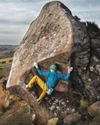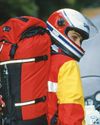
In May, 1989, a month and a half after the oil tanker the Exxon Valdez ran into a reef off Alaska’s Prince William Sound and spilled 11 million gallons of crude into the sea, Charlie Townsend and Dave Auble lay bivouacked on Mount Russell’s north ridge, battling a smaller disaster of their own making. The pair had just completed the first ascent of Russell’s east face.
No strangers to the dread niche of climbing snow in Alaska, Townsend and Auble were terrified by the fluted, corniced ridgelines on Russell. They’d attempted the mountain twice before, but had been too afraid to commit to the upper face without a decent prospect for retreat. Continuing upward into poorly protected terrain felt like a trap. But by 1989, Townsend, a rail-thin, bookish guide for Eastern Mountain Sports in North Conway, New Hampshire, thought he’d brainstormed the perfect solution.
“We found that if we trimmed the food and fuel and left the tent behind, a small paraglider would just fit into each pack,” Townsend would write in the 1990 American Alpine Journal. “The paragliders opened up new options, but we still told our pilot to look for us at the foot of the northeast ridge, in case we couldn’t—or wouldn’t—jump.”
The sport of paragliding was relatively new, and flying what were then primitive wings was finicky under the most ideal circumstances. To save weight, Townsend and Auble had trimmed the stock harnesses and other “unnecessary” impedimenta from their wings. Even for the time, the plan was insane. Paragliders of the era were unreliable, dangerous tools. Predicting wind patterns in the tumultuous Alaska Range was little more than optimistic garage science.
Denne historien er fra December/January 2020-utgaven av Rock and Ice.
Start din 7-dagers gratis prøveperiode på Magzter GOLD for å få tilgang til tusenvis av utvalgte premiumhistorier og 9000+ magasiner og aviser.
Allerede abonnent ? Logg på
Denne historien er fra December/January 2020-utgaven av Rock and Ice.
Start din 7-dagers gratis prøveperiode på Magzter GOLD for å få tilgang til tusenvis av utvalgte premiumhistorier og 9000+ magasiner og aviser.
Allerede abonnent? Logg på
Call of Duty
Vikki Weldon: Hard lines and the front line
THE BADGE
WE DEFINE OURSELVES AS CLIMBERS, BUT IS THAT GOOD ENOUGH?
THE ACHIEVER
MARICELA ROSALES HAD EVERYTHING AGAINST HER. SHE BECAME A CLIMBER ANYWAY.
Chris Sharma
FIRST ASCENTIONIST, FORMER WORLD CHAMPION, OWNS GYMS IN SPAIN AND USA. INTERVIEWED IN QUARANTINE IN BARCELONA WITH HIS WIFE, 3-YEAR-OLD DAUGHTER AND 1-YEAR-OLD SON.
PROJECT WAIT
A LIFELONG CLIMBER CONSIDERS THROWING IN THE TOWEL
Older, Wiser, Stronger!
YES, THEY CAN GO TOGETHER. HOW TO TRAIN STRENGTH AS YOU COME ALONG DOWN THE ROAD.
CALCULATED RISK
HOW UNDERSTANDING DANGER COULD KEEP YOU OUT OF HARM’S WAY

Accessories To Climb
Field tested

To The Grit
About 10 winters ago I touched down in Manchester in a hard, driving English rain. The city was hidden from view. I was groggy after a red-eye from Dallas, an over-brewed black tea barking on my dry tongue.

The Wild Ones
North Conway is a typical New Hampshire town tucked among rolling hardwood hills and set at the foot of imposing granite slabs, but 30 years ago it was the stage on which a small band of climbers led the way in boldness and vision.